 Petzlover
Petzlover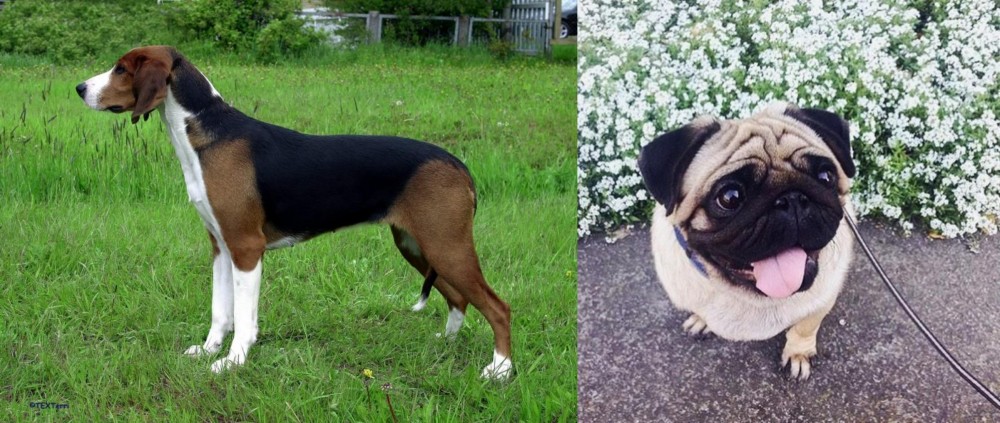 Finnish Hound is originated from Finland but Pug is originated from China. Finnish Hound may grow 26 cm / 11 inches higher than Pug. Finnish Hound may weigh 16 kg / 36 pounds more than Pug. Both Finnish Hound and Pug has almost same life span. Both Finnish Hound and Pug has almost same litter size. Both Finnish Hound and Pug requires Low Maintenance.
Finnish Hound is originated from Finland but Pug is originated from China. Finnish Hound may grow 26 cm / 11 inches higher than Pug. Finnish Hound may weigh 16 kg / 36 pounds more than Pug. Both Finnish Hound and Pug has almost same life span. Both Finnish Hound and Pug has almost same litter size. Both Finnish Hound and Pug requires Low Maintenance.
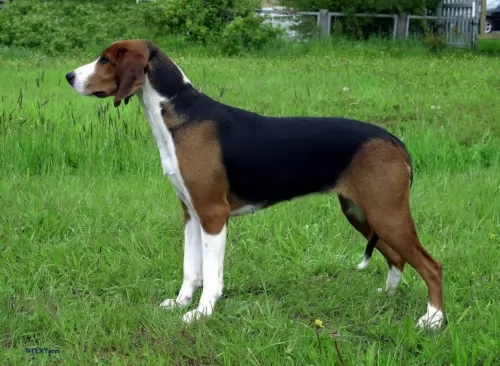 As one of Finland’s most popular dogs, the Finnish Hound isn’t particularly well known outside of Finnish borders. Known also as the Finsk Stovare, the Finnish Hound, known for its hunting skills, came about because of a breeding effort which started way back in the 1800s, mixing dogs such as different French, Swedish, and German hounds.
As one of Finland’s most popular dogs, the Finnish Hound isn’t particularly well known outside of Finnish borders. Known also as the Finsk Stovare, the Finnish Hound, known for its hunting skills, came about because of a breeding effort which started way back in the 1800s, mixing dogs such as different French, Swedish, and German hounds.
These hounds were used with the idea being to develop a dog that could do well in Finland’s terrain. The Finnish Hound is a great hunting dog but isn’t looked upon as an particularly awesome pet, although some pet owners would beg to differ.
 It is believed that Pugs originated in China, but not much is known about the early history of these dogs. There are some dog experts who believe that the dogs were brought to Holland by Portuguese traders in the 16th century.
It is believed that Pugs originated in China, but not much is known about the early history of these dogs. There are some dog experts who believe that the dogs were brought to Holland by Portuguese traders in the 16th century.
These dogs then went from Holland to England in 1689. The American Kennel Club registered the Pugs in 1885.
In 1931, the Pug Dog Club of America was established.
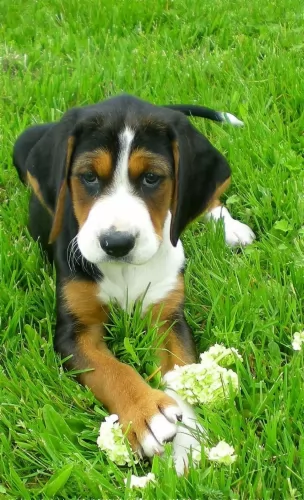 This is a medium sized dog who stands between 52 – 62cm in height and weighs in at 20 to 25kg. The Finnish Hound can have between 4 – 8 puppies.As a scent-hound, the Finnish Hound has a short, smooth double coat which is usually in a tri-color pattern of black, tan, and white.
This is a medium sized dog who stands between 52 – 62cm in height and weighs in at 20 to 25kg. The Finnish Hound can have between 4 – 8 puppies.As a scent-hound, the Finnish Hound has a short, smooth double coat which is usually in a tri-color pattern of black, tan, and white.
The attractive dog has an athletic, lean, muscular body full of energy and stamina. The eyes are brown and the dog has a peaceful expression. The medium length ears are floppy and the tail is long and carried low.
The Finnish Hound is friendly, calm and never aggressive. He is an intelligent dog nd will respond to the training and socialization he will require to turn him into an obedient, amicable pet, especially since he tends to be stubbon, independent and strong-willed. He isn’t recommended for small places in the city but will do better in the country with a fairy large piece of ground. The Finnish Hound is not recommended for apartment life. It is moderately active indoors and does best with at least an average-sized yard.
 Pugs are small dogs standing at roughly 25cm and 36cm in height and weighing between 6 and 8.5kg. They are categorized as a toy breed.
Pugs are small dogs standing at roughly 25cm and 36cm in height and weighing between 6 and 8.5kg. They are categorized as a toy breed.
The head is large in size compared to the body. It’s the eyes which are quite distinct – being particularly large and prominent, almost bulging. The face is fairly wrinkled too with the muzzle being short or blunt and black in color.
The coat of the dog is smooth and short with colors mainly being fawn, but black is also seen. The ears are medium sized and floppy while the tail curls up tightly over the back.
The Pug is unusual to look at and also has an unusual personality. He is an entertaining dog with his clownish antics but he happens to be intelligent too, and will respond well to training and socialization.
With their short coats they are regarded as low-maintenance dogs, although the short, double coat does shed quite a bit. They’re also not your typical live-wire and can quite easily be found lounging around.
Of course they can’t be left to do this too often as obesity can easily set it. Pugs will certainly need some physical exercise and mental stimulation. They’re playful dogs and get on well with children and other pets, especially if there are games to be enjoyed.
They are loyal, affectionate pets with their human owners and make a good pet for those living in the city or in the countryside.
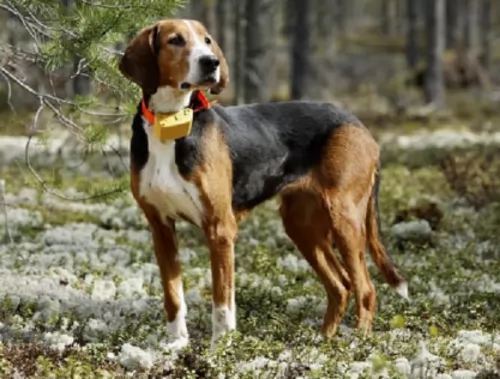 The Finnish Hound has always been a working dog and so he will require being well exercised.
The Finnish Hound has always been a working dog and so he will require being well exercised.
He makes a good pet with homes where there are other dogs as well as children. As a hunting or working dog, these days the Finnish Hound is also regarded as a companion animal, fitting into family life well, and turning out to be a loving, loyal pet.
 The Pug just loves spending time with his human family. They’re good with other dogs too and with children.
The Pug just loves spending time with his human family. They’re good with other dogs too and with children.
They’re even tempered and will make anyone a splendid family pet, so long as they’re not heavy into things like jogging and cycling.
He is alert and can make you a good watchdog. With all the love he comes with, the comical Pug can make you a most wonderful pet and friend.
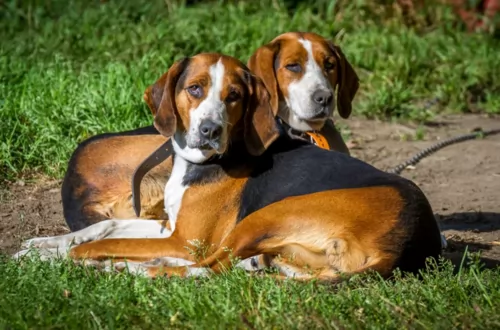 The Finnish Hound is looked upon as a generally healthy breed who can get to 12 years of age if looked after well. Good nutrition plays a huge role towards excellent health.
The Finnish Hound is looked upon as a generally healthy breed who can get to 12 years of age if looked after well. Good nutrition plays a huge role towards excellent health.
Check out common health ailments that can affect most dogs such as dental disease, obesity, hip dysplasia and a serious condition for which these dogs are particularly known – cerebellar ataxia. Lesions in the brain affect the dog’s coordination and sight. Get him to the vet as soon as you detect anything unusual with your pet.
 Every dog, regardless of breed, can develop health problems. Good nutrition, exercise and love and care go a long way to ward off diseases and ensure your pet has a healthy, happy life.
Every dog, regardless of breed, can develop health problems. Good nutrition, exercise and love and care go a long way to ward off diseases and ensure your pet has a healthy, happy life.
The Pug can also develop certain health problems and we look at one or two -
This is inflammation of the brain and it causes seizures. Unfortunately there isn’t a cure. This neurological disease is luckily rare. Usually it attacks young Pugs of 2 or 3 years of age. Seizures, neck stiffness, loss of co-ordination, lethargy are all signs of this disease.
Sad though it may be, the best way forward would be to put your dog to sleep, but in any case your vet will discuss all options with you.
With this disease, your Pug can have breathing problems, which can be aggravated if the Pug is overweight or the weather particularly hot. Don’t exercise your Pug too vigorously on a hot day.
Stenoic nares is a medical term for narrow nostrils in a dog, and this is precisely what the Pug battles with. If the Pug battles too much with breathing problems, corrective surgery is possible.
Pugs often have to contend with some serious dental problems, and this is because their teeth are crowded. He may require more dental attention than other dogs.
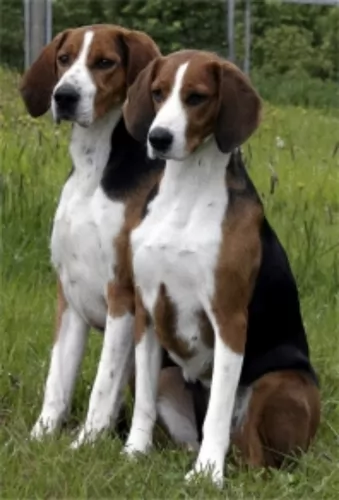 As a medium-sized dog breed, you want to make sure to feed your dog a high-quality commercial dog food – one that has been formulated with the right amount of vitamins and minerals for the type of dog he is.
As a medium-sized dog breed, you want to make sure to feed your dog a high-quality commercial dog food – one that has been formulated with the right amount of vitamins and minerals for the type of dog he is.
He is a high-energy hunting breed, so you wan to find a food that is appropriate to his needs. Home cooked brown rice, vegetables and chicken can be added into his kibble as a change and a treat from time to time as well as some raw meat occasionally. Make sure he always has access to fresh, cool water.
Physically active and mentally balanced and intelligent, the Finnish Hound will require both physical and mental stimulation to prevent him from becoming bored and frustrated.
As an average shedder, your pet's smooth, short-haired coat is easy to keep in tip top condition. All that is really required is to brush the coat down twice a week to keep it in peak condition.
Don’t neglect to check the inside of the dogs ears, as too much dirt and wax can cause nasty ear infections. Also, the teeth need to be brushed at least 2 or 3 times a week with special canine toothpaste and toothbrush. This will ward off tooth decay and lots of other problems within the body brought about by bad teeth.
 Grooming your Pug’s coat will simply require a brush twice a week. They’re fairly heavy shedders these Pugs so you can’t neglect the brushing.
Grooming your Pug’s coat will simply require a brush twice a week. They’re fairly heavy shedders these Pugs so you can’t neglect the brushing.
It’s your chance to check the inside of his ears for signs of redness and to also check that his eyes are alright. You’ll also need a damp cloth to wipe his face and get rid of debris caught in the wrinkles. Run your hands over his body and make sure there aren’t any unusual new lumps. Keep his nails trimmed too.
Your Pug will need the best food there is to give his health the best chance. Remember that if you buy commercially manufactured dog food, to buy the very best one there is. Some of the poorer quality ones don’t come with the right balance of vitamins and minerals, and they also have lots of bad colorants and preservatives.
Also, be careful to read the packaging. Your Pug is a toy breed so you can’t be buying him food for large breed dogs such as Mastiffs or German Shepherds.
Consistency and simplicity is what your Pug wants from you. Home-made food is always an excellent choice for your pet’s diet. Boiled chicken, brown rice or pasta and spinach, sweet potatoes and carrots can be very healthy for him. For your Pug, chop it all up and maybe twice a week add it into the dry kibble.
Some raw meat added in occasionally will also ensure his good health. Always make sure he has access to fresh, cool water.